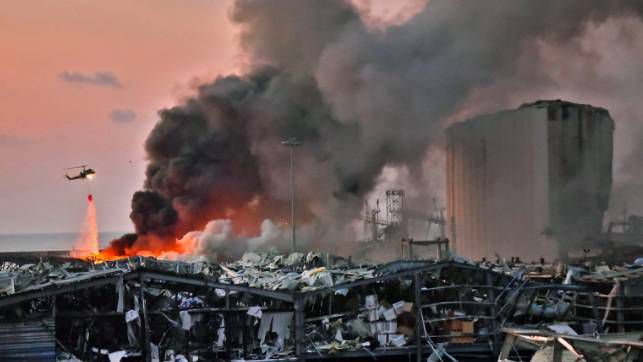EL SEGUNDO, Calif. – A week ago, a massive explosion rocked the port of Beirut, Lebanon. More than 160 people were killed, thousands were injured or continue to be missing.
Another 300,000 have been left homeless.
What You Need To Know
- 2,750 tons of ammonium nitrate blew up in Beirut's port
- The blast ranks as one of the world's largest non-nuclear explosions
- Lebanon's prime minister and the rest of his Cabinet resigned six days after the explosion
- Los Angeles Times' Middle East correspondent, Nabih Bulos was less than 500 yards away from the explosion
This week, the prime minister and Lebanon's government resigned.
Nabih Bulos is the LA Times Middle East Bureau Chief stationed in Beirut. He was injured in the blast, which is being called one of the world's largest non-nuclear explosions.
“The last thing I do remember clearly is me getting on my motorcycle right under my building and starting to head towards the port. I don’t remember which way I took to get to the port. I don’t know where I got to before the big explosion happened. What I remember after is waking up, unsure of where I am. And I guess I lost consciousness,” said Bulos.
Bulos recalled a medic talking to him as they wrapped a bandage around his head, because the top of his head was bleeding. His priority was finding his phones to find his friends and fiancée, who he said had given him step-by-step instructions on how to activate the location tracker so she could find him.
He was taken to a hospital outside of Beirut because all the local hospitals were inundated with the injured. At the time, the sky was a smoky sepia color and people had no idea what was going on. They didn’t know if it was a big airstrike or if it was an earthquake.
Bulos considers himself extremely lucky to have been able to make it out ok. He also realized that people can be very kind in times of crisis. In his neighborhood, volunteers were walking around sweeping away the mess caused by the explosion. Dozens of charitable groups and mutual aid organizations have reoriented themselves to dealing with the tragedy.
“The fact is it was really a moment of sheer human grace and generosity. When I arrived at the hospital, one hour outside of Beirut, I met a friend of my brother’s, someone who I had never met before. He arranged for a CT scan. He brought his neurosurgeon friend. He then put us up in a hotel. He brought us food. It was just amazing the amount of generosity,” Bulos added.
Beirut has had some difficult times in recent years, and questions about last week’s blast have centered on why the stockpile of ammonium nitrate had remained in the port for more than six years even after officials repeatedly asked for its removal.
Still, there were no answers.
Since the explosion, protests that erupted last fall over the country’s struggling economy, but were suspended out of coronavirus fears have resumed. The negligence has pushed enraged people into the streets. Protesters have clashed with security forces, and they have turned violent.
“The fact is that these are people that have been in charge, basically since the Civil War, if not even before. A lot of them are warlords who then became politicians. Any government needs to be a power-sharing arrangement. What this means in effect is that often times nothing gets done. I don’t see much hope unfortunately for real change, but I’m hoping it will happen,” Bulos said.



